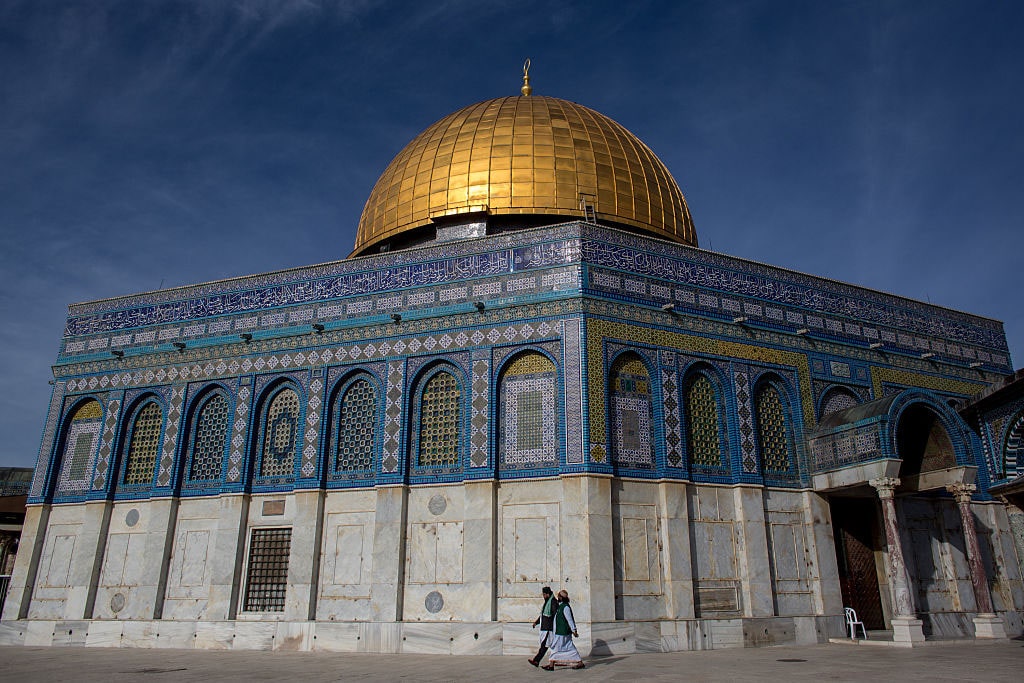
The Media Line — During a stroll inside Jerusalem’s Old City, or a drive around the Arab neighborhoods in east Jerusalem, one cannot help but notice Turkish flags hanging outside shops and atop homes, as well as the affinity and warm welcome extended to Turkish tourists visiting the holy city.
Another sign of the rising Turkish influence among Palestinians is the availability and abundance of Turkish goods in markets in east Jerusalem and throughout the Palestinian territories.
The Turkish presence in east Jerusalem is highly visible. This not only worries Israel, but also is a source of concern for the so-called moderate Arab states, as Turkish President Recep Tayyip Erdogan continues to champion the Palestinian cause, adding to Ankara’s rising popularity among Palestinians.
Turkey, Jordan and the Arab countries that have normalized relations with Israel in recent months are all working around each other in order to position themselves to strike a deal with Israel for control over Jerusalem’s Muslim holy sites. The country that gains control of the holy sites upgrades its position in the Muslim world.
The holy sites, most notably the Al-Aqsa Mosque compound in east Jerusalem, currently are under the custodianship of the Hashemite Kingdom of Jordan through the Jerusalem Islamic Waqf. This is enshrined in the peace treaty signed in 1994 between Israel and Jordan.
In the last few years, a large number of Turkish visitors to east Jerusalem have come with the main goal of praying at the Al-Aqsa Mosque.
The Turkish Cooperation and Coordination Agency (TIKA) operates in east Jerusalem, the West Bank and the Gaza Strip, pumping millions of dollars into aid, relief and charity projects. The agency said in a statement to The Media Line that the main focus of its projects is humanitarian and restoring Islamic sites.
Ahmed al-Burai, an Istanbul-based Middle East analyst and lecturer at Istanbul Aydin University, told The Media Line that it is important for Turkey to have a presence in Jerusalem.
“In principle, Turkey considers the Palestinian cause one of its main missions in the Middle East, and especially after the arrival of the current ruling AK Party (Justice and Development party) and President Erdogan, the Palestinian cause is at the forefront of its main priorities,” Burai said.
He says that no one should doubt the intentions of Turkish activities in the city, which are meant to preserve Jerusalem’s Islamic identity and to help the city’s Palestinian residents.
Observers say that Turkey has historical claims to guardianship of the holy sites, and that Erdogan has ulterior motives, such as dreams of reviving the Ottoman Caliphate.
“For Turkey it’s a comprehensive issue, particularly Jerusalem is very essential as one of the sacred sites for Muslims, and because of the Caliphate and the legacy of the Ottoman Empire,” Burai said. “Turkey has a commitment toward Jerusalem. That’s why they are sending groups there, whether in terms of education, endowments to support the people of Jerusalem and to preserve the heritage of the Ottoman Empire, and to keep their presence there and to not give a chance to the occupation to erase the Muslim legacy in the city,” he said, highlighting his concern about the Judaization of sites in Jerusalem.
“The leadership in Ankara attributes great importance to all territories where Ottomans once ruled. However, given the religious importance of Jerusalem and its significance for political Islam, this presence is becoming even more meaningful when compared to other regions.”
Hay Eytan Cohen Yanarocak, a researcher at the Moshe Dayan Center for Middle Eastern Studies at Tel Aviv University, told The Media Line that Turkey sees itself as the successor state of the Ottoman Empire.
“The leadership in Ankara attributes great importance to all territories where Ottomans once ruled. However, given the religious importance of Jerusalem and its significance for political Islam, this presence is becoming even more meaningful when compared to other regions,” he said.
Yanarocak added that the recent rapprochement between Israel and some Arab governments has diminished Ankara’s role.
“Recently Turkey’s above-mentioned monopoly of having the only normal relationship with Israel faded away with the Abraham Accords. Especially the opening of the Saudi airspace to Israeli and foreign planes flying to Israel,” he said.
Jordan has for some time been suspicious of Turkey’s activities in east Jerusalem, and specifically those around the Noble Sanctuary of Al-Aqsa Mosque, arguing that it threatens the Hashemite guardianship of Muslim holy sites in the city.
Twenty-six years after the signing of their landmark peace treaty, Jordan’s relations with Israel remain rocky. The Wadi Araba Treaty, which was signed on Oct. 26, 1994, formally ended decades of war between the two neighbors. Jordanian academic Dr. Labib Kamhawi says that Jordan’s role in the city is at risk of being changed.
Kamhawi told The Media Line that the Hashemite guardianship of Jerusalem’s Islamic and Christian sites derives its existence from the Wadi Araba agreement between Jordan and Israel.
“This agreement indicated in one of its clauses that Israel emphasizes the role of Hashemi in the custody of the holy sites. This means that the basis for the legitimacy of this speech is based on Israel and not from Islam, or that it is a religious guardianship based on religious factors,” he said.
This is the danger, says Kamhawi, which is what worries Jordan and its monarchy regarding the Israeli-Saudi rapprochement, and the normalization agreements between Israel and the UAE, and Israel and Morocco.
“Israel agreed that guardianship of the holy places be a right for Jordan, which it can withdraw from Jordan according to its interests. It all depends on political interests,” said Kamhawi.
The issue of Jerusalem is one of the most difficult aspects of the Israeli-Palestinian conflict. Israel annexed the city after the 1967 war, a move never recognized by the international community.
“The issue of custodianship is sensitive for the Hashemites because it touches on their religious legitimacy,” according to Kamhawi.
But it’s getting crowded, after the normalization deals between Israel and several Arab states, with experts pointing out that Jordan has more countries competing with it over management of Islamic sites in the holy city.
Even Saudi Arabia, which has not normalized relations with Israel, has its eye on controlling Islamic sites in the city. Following its normalization deal with Israel, Morocco also joined a group of Arab states that wants to claim control of Jerusalem’s Islamic sites.
“Morocco has a special gate in Jerusalem called the Moroccan gate, as a country and as people they have strong ties to the city,” said Burai.
King Mohammed VI of Morocco is head of the Al-Quds (Jerusalem) Committee, formed in 1975, and its chair was assigned to the then-King of Morocco, Hassan II. After his death in 1999 this was passed to his son, King Mohammed VI.
“The Moroccan king calls himself the Commander of the Faithful as well since these religious titles gives these kings divine legitimacy to continue their rule. They say that their judgment has a religious character, and they should not be questioned,” according to Burai.
Criticism also is targeted against the United Arab Emirates, not only for establishing diplomatic ties with Israel, but also for what many Palestinians describe as “suspicious” activities in Jerusalem’s Old City.
Sheikh Kamal Khatib, deputy leader of the Islamic Movement in Israel, told The Media Line that the UAE has an old role in “tampering with the rights of Palestinians and Muslims in Al-Quds Al-Sharif,” the Arabic term for Jerusalem.





















 More news and opinions than at a Shabbat dinner, right in your inbox.
More news and opinions than at a Shabbat dinner, right in your inbox.